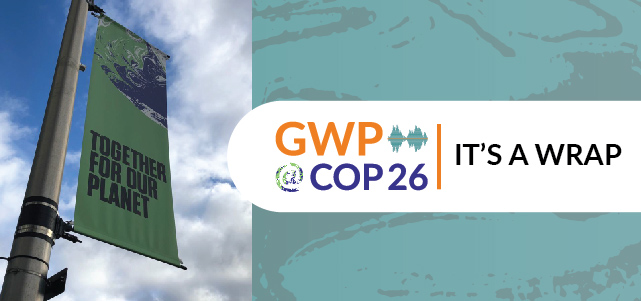The draft agreement acknowledges that water has a role to play in climate change through oceans, the cryosphere, nature-based solutions, and ecosystems-based approaches. GWP’s three takeaways from the conference.
GWP played an active role, attending and participating in a range of water-related events which were held for the first time in a designated Water Pavilion. Having this special area, dedicated to discussing water challenges, allowed more than 30 organisations, governments, and companies to deliver innovative, science-based advice to climate decision makers.
“Water is the ‘blue thread’ that weaves its impact through every aspect of our lives,” said Darío Soto-Abril, Executive Secretary of GWP, one of the main organisers of the Pavilion. “The world can’t be climate resilient if it’s not water resilient – which means climate agreements need a strong dose of smart water management policies and the financing to implement them.”
GWP has IGO (Intergovernmental Organisation) observer status with the UNFCCC (United Nations Framework Convention on Climate Change).
Funding success
In the first week of the event, GWP welcomed the endorsement of a US$566,000 Readiness Proposal for Eswatini at a Green Climate Fund (GCF) Executive Committee meeting. This news followed recent endorsements of $672,000 for Sri Lanka and $814,000 for Somalia.
“GWP provided hands-on support to these countries to develop and submit those proposals that make a direct contribution to building climate resilience at the local and national level,” said Alex Simalabwi, GWP’s Global Lead on Climate Change and Executive Secretary of GWP Southern Africa. At COP 26, financial commitments for adaptation doubled, especially for developing countries.
Meanwhile, at an event on the margins of the World Leaders Summit, former Tanzanian leader and Chair of Global Water Partnership Southern Africa and Africa Coordination, H.E. President Jakaya Kikwete, called on the international community to support the establishment of an International High-Level Panel on Water Investments for Africa. He stressed that the need was ‘urgent’.
“One in three Africans face water insecurity, about 400 million Africans have no access to safe drinking water and about 700 million do not have access to good sanitation. The economic and service sectors do not get the water they need for optimal performance thus impeding socio-economic growth and development,” said H.E. President Kikwete.
Supporting major initiatives
During COP26, GWP supported several major initiatives to move water up the development agenda:
- As part of the Water and Climate Coalition GWP signed a letter to Heads of State with a call for “Accelerated action … to address the water-related consequences of climate change that impact people and the planet”.
- GWP added its voice to the Glasgow Declaration for Fair Water Footprints which calls on the global community to transform how the world’s economy interacts with water and the resilience of local communities for the production of exportable goods in developing countries.
- GWP continued to support the development of the Resilient Water Accelerator, to push for greater investment to bring clean water to 50 million people in Africa and Asia by 2030.
- GWP’s contribution to the 2021 State of Climate Services report by the World Meteorological Organization (WMO) was recognised at a launch event during COP26.
Hearing from regional voices
The event also allowed GWP to highlight a range of regional voices, who shared their ground-level experience at different events – including a gender and social inclusion perspective from Cameroon. Simplice Tchinda, Director of the Department of Meteorology and the Permanent Representative of WMO in Cameroon, stressed the importance of engaging with those who are most affected by water challenges. “Our objective is to get climate information to the end users who are often in rural communities and working with GWP Central Africa made this easy for us,” he said.
GWP South America shared the story of their ‘Blue good practices’ programme, developed in conjunction with the Chamber of Industries of Uruguay, which involves establishing links with the private sector through the promotion of a circular economy. By developing capacities in companies for efficient use of water in their production processes, this model has the potential to result in water benefits for all.
ChangeMaker journey comes to an end
In the second week of COP26, GWP celebrated the achievements of the 2020 Water ChangeMakers who featured in a special event where they had a chance to deliver messages to decision makers. Gold ChangeMaker winner, Billie Dumaliang, who is the Advocacy Officer & Trustee at the Masungi Georeserve Foundation in the Philippines, called on global leaders to ‘not forget’ those on the frontline of environmental activism.
“The things that are destroying the forests are actually brought about by broken systems, damaged institutions and organised crime … it’s against these activities and opportunities that we need to stand up and stop them from destroying our forests in the name of progress,” she said.
One GWP delegate noted that meaningful youth engagement and indigenous perspectives emerged more strongly at this COP than ever before.

